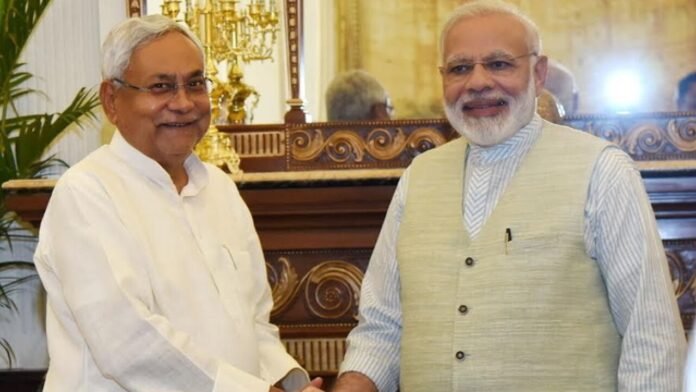Nitish Kumar, the stalwart leader of the Janata Dal (United), made a decisive move by returning to the National Democratic Alliance (NDA) fold after a brief hiatus. This “ghar wapsi” (homecoming) marked a strategic realignment in Bihar’s political dynamics, reshaping alliances and setting the stage for the upcoming state elections. However, Nitish Kumar’s return to the NDA was not a spontaneous decision but the culmination of a series of political maneuvers and ground-level preparations.
The groundwork for Nitish Kumar’s ‘ghar wapsi’ was laid against the backdrop of shifting alliance dynamics and electoral arithmetic in Bihar. Following the 2020 Bihar Assembly elections, where the NDA emerged victorious but with a reduced majority, there was speculation about the stability of the ruling coalition. The need for a cohesive alliance to tackle the challenges of governance and political opposition became increasingly evident, prompting discussions about the realignment of political forces.
Nitish Kumar’s decision to return to the NDA was driven by strategic calculations and power dynamics within the state and at the national level. As a seasoned politician known for his pragmatism and astute political maneuvering, Kumar assessed the changing political landscape and recognized the advantages of rejoining forces with the BJP-led NDA. By aligning with the ruling coalition at the center, Kumar sought to consolidate his political position and strengthen his bargaining power within the state.
Another factor that contributed to Nitish Kumar’s ‘ghar wapsi’ was the alignment of policy priorities and development agendas between the JD(U) and the BJP. Despite ideological differences and occasional disagreements, both parties shared a common vision for Bihar’s development and governance. Kumar’s return to the NDA provided an opportunity to reaffirm this shared commitment and work collaboratively towards addressing the state’s socio-economic challenges.
The political landscape in Bihar was further influenced by regional dynamics and the fragmentation of the opposition. With the emergence of new political players and the disarray within the opposition ranks, Nitish Kumar’s reentry into the NDA offered a sense of stability and coherence to the ruling coalition. By presenting a united front, the NDA aimed to capitalize on the disarray within the opposition and strengthen its electoral prospects in the upcoming state elections.
Ultimately, Nitish Kumar’s decision to return to the NDA was shaped by public perception and the mandate received from the electorate. As a seasoned leader with a reputation for delivering governance and development, Kumar gauged the public mood and assessed the electorate’s expectations. By aligning with the NDA, Kumar sought to reaffirm his commitment to fulfilling the promises made to the people of Bihar and securing their trust and support in the upcoming elections.
The process of Nitish Kumar’s ‘ghar wapsi’ also involved intricate negotiations and power-sharing arrangements within the NDA. While Kumar’s return was welcomed by the BJP leadership, there were discussions about the distribution of ministerial portfolios and the allocation of seats in the state cabinet. Through these negotiations, Kumar sought to assert his party’s influence and ensure a fair representation of JD(U) interests within the ruling coalition.
Beyond the immediate political realignment, Nitish Kumar’s ‘ghar wapsi’ reflected long-term strategic planning and vision for Bihar’s future. By rejoining the NDA, Kumar signaled his commitment to stability, continuity, and governance, setting the stage for a renewed focus on development and progress in the state. As Bihar gears up for the next phase of political competition, Kumar’s return to the NDA is poised to shape the state’s political trajectory and define its future direction.
In a nutshell, Nitish Kumar’s ‘ghar wapsi’ to the NDA was the result of careful deliberation, strategic calculations, and ground-level preparations aimed at consolidating political power, strengthening alliance dynamics, and addressing the challenges of governance and development in Bihar. As the state prepares for the upcoming elections, Kumar’s realignment with the NDA sets the stage for a new chapter in Bihar’s political journey, with far-reaching implications for its future trajectory and governance agenda.

